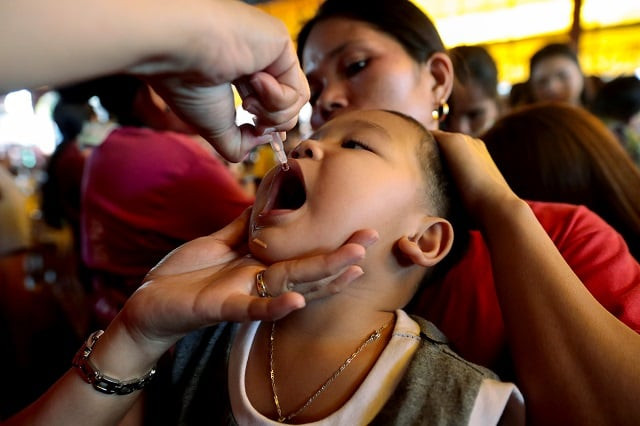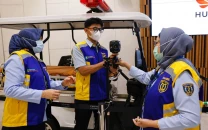Malaysia reports first case of polio since 1992
Development comes just months after the Philippines reported its first cases of polio since 1993 in September

A child receives free polio vaccine during a government-led mass vaccination program in Quezon City, Metro Manila, Philippines, October 14, 2019. PHOTO: REUTERS/FILE
The baby boy from Tuaran in Malaysia's Sabah state on Borneo island tested positive for polio on Friday after being admitted to hospital with a fever and muscle weakness, Director General of Health Noor Hisham Abdullah said in a statement.
"The patient is being treated in an isolation ward and is in stable condition, but still requires assistance to breathe," he said.
Malaysia was declared polio-free in 2000, after reporting its last known case of the disease in 1992. Its resurgence comes just months after the Philippines, north of Borneo, reported its first cases of polio since 1993 in September.
Noor Hisham said tests showed the child was infected with a polio strain that shared genetic links with the virus detected in the Philippine cases.
Fake polio markers highlight risks to Pakistan vaccination drive
Checks in the area where the baby lived showed 23 of 199 children between 2 and 15 had not received the polio vaccine, he said.
"This is a worrying situation as the spread of the disease ... can only be stopped with polio immunisation," he said, adding vaccination rates needed to be above 95% to prevent infection.
There is no cure for polio, which invades the nervous system and can cause irreversible paralysis within hours, but it can be prevented with vaccines.
The virus spreads rapidly among children, especially in unsanitary conditions in underdeveloped or war-torn regions where healthcare access is limited.
Afghanistan and Pakistan are the last countries where the disease is endemic.
Noor Hisham said fecal samples from the infected child's close contacts and his surroundings had been collected in a bid to detect the polio virus.
The authorities have also stepped up monitoring of acute flaccid paralysis (AFP) cases, a common sign of acute polio, he said.
Noor Hisham advised parents to ensure their children were fully vaccinated.
In recent years, Malaysia has faced a challenge convincing some parents to immunise their children. In 2016, five children died from diphteria, a vaccine-preventable disease, prompting an outcry among health officials.



















COMMENTS
Comments are moderated and generally will be posted if they are on-topic and not abusive.
For more information, please see our Comments FAQ